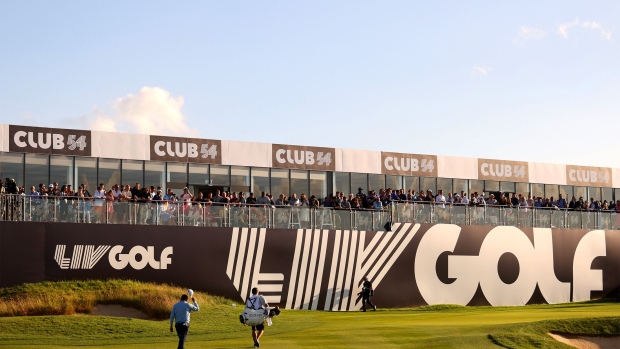Jun 7, 2023
PGA Golf Merger Is Saudi Arabia’s Biggest Soft Power Win Yet
, Bloomberg News

(Bloomberg) -- The shock merger of the PGA Tour and LIV Golf means Saudi Arabia’s strategy of using vast oil riches to boost its soft power by investing billions in global sports can claim its biggest victory to date.
Until yesterday it had looked a risky bet.
The kingdom’s Public Investment Fund spent hundreds of millions of dollars attracting some of the PGA’s most famous names, including Phil Mickelson and Dustin Johnson, to its LIV tournaments. The PGA responded with a costly lawsuit that had already dragged in families of victims of the 9/11 terrorist attacks and threatened to see the PIF’s boss, Yasir Al-Rumayyan, subpoenaed in a US court.
Now that a truce has been reached, bringing the likes of Tiger Woods and Rory McIlroy into the fold, attention turns to which sport Crown Prince Mohammed bin Salman and his inner circle will target next as they bid to further boost the country’s stature and sway on the global stage.
Saudi Arabia’s major cities have already hosted mega-money boxing bouts featuring everyone from heavyweight champions Anthony Joshua and Oleksandr Usyk to up-and-coming fighters Jake Paul and Tommy Fury. Its football clubs are drawing stars of the game to see out the final years of their careers on lucrative contracts. And the kingdom is now a venue for Formula 1 motor racing’s glitzy grand prix — last year the PIF considered a $20 billion attempt to buy F1.
“Saudi Arabia has had no trouble finding partners in the world of sport,” said Stanis Elsborg, senior analyst at Play the Game, a Denmark-based research body into ethical standards in sport. “By hosting prestigious sports events and investing in cultural activities, Saudi Arabia aims to position itself as a destination for international events and showcase a modern image to the world.”
Prince Mohammed wants to use sports as a tool to achieve multiple aims.
At home, the goal is to improve lifestyles and provide entertainment for Saudi Arabia’s mostly young citizens, who struggled under the restrictions of previously conservative regimes. Abroad, he’s out to change the kingdom’s reputation, which has been battered by the war in Yemen, allegations of human rights abuses and the murder of Saudi dissident Jamal Khashoggi.
As the dust settles on the PGA-LIV dispute, Saudi Arabia will be pleased with how it has emerged from the deal. Golf enthusiast Al-Rumayyan, a close confident of Prince Mohammed, will chair the merged business.
“Sport is an integral part of a much broader strategy and a vehicle in international relations to gain political goodwill, foster diplomatic relations, and attract investments,” said Elsborg.
The PGA tie-up came in the same week that the PIF and state oil firm Aramco said they’d take control of Saudi Arabia’s football clubs, with the aim of making its local league one of the top 10 globally. One of those teams, Al-Ittihad, has just recruited French international Karim Benzema from Real Madrid. Another, Al-Nassr, signed megastar Cristiano Ronaldo in late 2022. There had been hope that Argentine World Cup Winner Lionel Messi would join them.
A bid to co-host the FIFA World Cup in 2030 also appears to be in the making, with Saudi Arabia having seen the recent success of the tournament in neighboring Qatar, where Messi created an iconic image by lifting the trophy wearing a traditional Arab robe. That would add to plans to host the 2029 Asian Winter Games at Trojena, a mountain development in Prince Mohammed’s most ambitious plan of all — the $500 billion Neom city in the north-west of the country.
Human Rights
To be sure, Saudi Arabia’s sports push has its critics, who say the strategy is just a way for the kingdom to deflect from a poor domestic record on free speech and other human rights. And even those who receive Saudi Arabia’s cash aren’t always keen at first. When LIV launched and started to peel off players from the PGA tour with large pay packets, PGA commissioner Jay Monahan complained that the Saudis were trying to buy golf.
Yesterday, Monahan went on CNBC to say the merger was an opportunity for every professional male player in the sport. Al-Rumayyan, meanwhile, dismissed suggestions on the same network that sports investments were part of a campaign to clean up Saudi Arabia’s image, saying it was about meeting the interest of the country’s youth.
The Saudi government’s Center for International Communications didn’t respond to requests for comment.
“This merger is an attempt to sportswash the Saudi government’s reputation as a human rights violator,” Joey Shea, Saudi Arabia and UAE researcher at Human Rights Watch, said of the PIF-LIV deal. “When you have access to a sovereign wealth fund with over $600 billion of assets, it gives Saudi Arabia a basically unlimited capacity.”
©2023 Bloomberg L.P.





